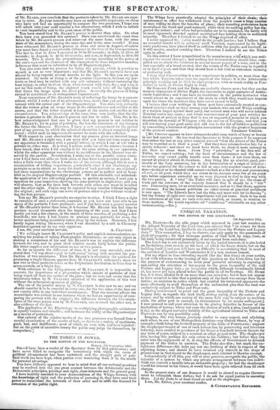UNEQUAL TAXATION.
TO THE EDITOR OF THE SPECTATOR.
7th September 1841.
Mn. Enrroo—In the able paper which appeared in your last number on the Alleged Necessity of the Corn-law, you assume that " in return fur their liability to the Land-tax, landlords are exempted from the Probate and Legacy. duty." This assumption, I beg to observe, can only apply to the possessors of freehold property ; for that immense portion of land held by copy, lease, or life hold, being considered personalty, is not exempt from suchduty. The Land-tax is not exclusively borne by the landed interest ; it is also levied on freeholders, (not merely on the land on which the house stands, but on the building itself;) and you will have no difficulty in ascertaining that in most of the parishes of London and Westminster it is a very onerous impost.
But my object in thus obtruding myself (for the first time) on your notice, is not with reference to the bearing of this question on the Corn-laws, but for the purpose of endeavouring to enlist your powerful advocacy in exposing of and calling the attention of tax-payers to the gross inequality of the said Probate and Legacy duty ; an inequality which, although occasionally' inted at, has never yet been placed before the public in all its bearings. Mr. HONE has, it is true, alluded to it on more than one occasion; but it does not appeisr to have occurred to him that a portion only of the land was exempt from these duties; an omission to notice which fact enabled his interested opponents the more effectually to avail themselves of the unfounded plea that the land was exclusively subject to Tithe and Poor-rate.
Having endeavoured to point out the gross inequality of the Probate and Legacy duty as regards the land itself, arising merely from the nature of its tenure, and by which one moiety of the same field may be subject to taxation while the other part is exempt, (a circumstance by no means unfrequent,) I now proceed to call your attention to its glaring injustice in favour of the freeholders of towns ; where not even the shadow of such a plea, (unfounded as it is,) as the alleged exclusive liability of the agricultural interest to Tithe and Poor-rate can by any possibility exist. •
Imagine, Sir, two houses precisely similar in every respect, and adjoining each other, in one of our Metropolitan districts—say Oxford Street, by way of example—both being the freehold property of the Duke of PORTLAND: SUpp0813 the shopkeeper-tenant of one of such houses has, by persevering and laborious industry, been enabled to purchase of his Grace a leasehold interest therein for any term of years, subject to a nominal or other ground-rent. The shopkeeper dies, leaving this perhaps his only estate to his children; but before they can enter into the enjoyment of it, in step the officers of Government to demand payment of the duties in question. The Duke also dies ; but mark the un- righteous difference—his heirs pay not one farthing of duty in respect of the adjoining house; and should he have retained any interest in the shape of ground-rent in that leased to the shopkeeper, such interest is likewise exempt. Independently of all this, you will at once perceive, as regards the public, the injustice of a system by which any private arrangement between two indivi- duals can convert a taxable into an untaxable property ; for had the shopkeeper resold his interest to his Grace, it would have been again relieved from all such charges.
In the present state of our finances it would be absurd to require Govern- ment to relinquish these duties; but I do ask for equal justice in assessing them. Let the Duke be at least taxed as well as the shopkeeper.
I am, Mr. Editor, your constant reader, A CONSERVATIVE Ituroamix.


























 Previous page
Previous page